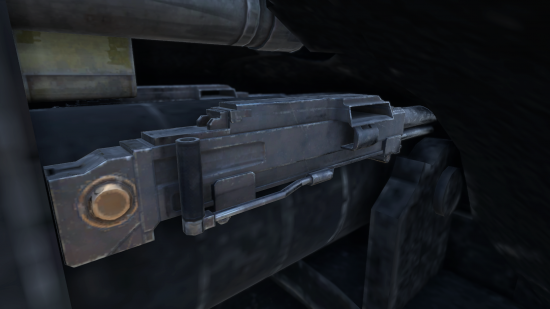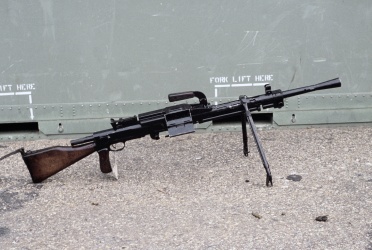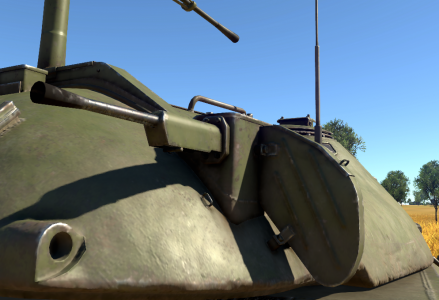RP-46 (7.62 mm)
Contents
Description
The Soviet Degtyaryov machine gun or RP-46 was modified with a heavier barrel to allow for the sustained fire of around 500 rounds before the barrel had to either be replaced or allowed to cool down.
Vehicles equipped with this weapon
General info
Tell us about the tactical and technical characteristics of the cannon or machine gun.
Available shells
Describe the shells that are available for the cannon and their features and purpose. If it concerns autocannons or machine guns, write about different ammo belts and what is inside (which types of shells).
Comparison with analogues
Give a comparative description of cannons/machine guns, that have firepower equal to these type of weapons.
Usage in battles
Describe the cannon/machine gun in the game - its distinctive features, tactics of usage against the main opponents. Please don't write a "guide" - do not impose a single point of view, but give the reader food for thought.
Pros and cons
Summarize and briefly evaluate the weaponry in terms of its characteristics and combat effectiveness. Mark pros and cons as a list.
Pros:
Cons:
History
In World War II, the primary light machine gun of the Soviet Red Army was the DP (Degtyaryov Pechotnyi, or Degtyaryov Infantry) or its modernized variant DPM. However, these machine guns were fed by 47 round pan-shaped magazines, which were quite cumbersome to use. Experience in World War II showed the feasibility of belt-fed machine guns and the great firepower asset those weapons posses, such as the German MG34 and MG42. The Soviet military's desire for such a machine gun quickly resulted in a further modification of the DP machine gun to transform it from a magazine-fed system into a belt-fed. This was released in 1946, and was designated as the RP-46 (Rotnyj Pulemet, 1946, or Company Machine Gun).[1]
As a way to quickly turn existing DP machine guns into RP-46, the modification was more akin to an add-on module than a redesign of the weapon in the form of a new top cover design. This top cover is placed in a manner similar to a DP magazine and enables the RP-46 to feed from SG-43/SGM belts.[1][2] Other changes associated with the RP-46 design is a heavier barrel that is capable of being quickly changed, a new gas block and system for the belt-fed mechanism, and a carry handle on the belt-fed top cover design which requires a cut-out on the RP-46 barrel to fit.[3]
As a company machine gun, the RP-46 was able to be set-up in a niche between a light squad automatic weapon like the RPD, and a heavy machine gun emplacement like a SG-43. However, as a modification to a magazine-fed machine gun, the RP-46 had issues adapting with belt-fed conventions, such as the inability to hold the belt box. This affected the weapon's portability as this means the RP-46 must be unloaded prior to being moved. The RP-46 remained as a front-line weapon until the 1960s when it was replaced by the Soviet's newest universal machine gun, the PK machine gun.[1]
The RP-46 and its DP variants would continue to see service in other Soviet-aligned countries. The Chinese and North Korean are most notable for producing their own versions of the RP-46 as the Type 58 and Type 64 respectively.[4]
Media
- Images
See also
- DT (7.62 mm) - Tank-mounted variant of the DP machine gun.
- DA (7.62 mm) - Aircraft-mounted variant of the DP machine gun.
External links
References
- Citations
- Bibliography
- McCollum, Ian, "RP46 LMG." Forgotten Weapons, 10 Jan. 2011, Website. Accessed 02 Apr. 2021 (Archive).
- McCollum, Ian, "RP46 Variations: Russian, North Korean, and US Reproduction." Forgotten Weapons, 04 Jul. 2018, Website. Accessed 02 Apr. 2021 (Archive).
- Popenker, Maxim, "Degtyarov DP DPM RP-46." Modern Firearms, Website. Accessed 02 Apr. 2021 (Archive).
- WeaponSystems.net, "RP-46" WeaponSystems.net Website. Accessed 02 Apr. 2021 (Archive).
| Tank machine guns | |
|---|---|
| USA | |
| 7.62 mm | M37 · M60D · M73 · M240 · M1919A4 · Mk.52 |
| 12.7 mm | FN M3P · M2HB · M80 · M85 |
| Germany | |
| 5.56 mm | MG4 |
| 7.62 mm | C6 · MG3A1 |
| 7.92 mm | MG13 Dreyse · MG34 · MG37(t) · MG42 |
| 12.7 mm | S.MG.50 |
| USSR | |
| 7.62 mm | DT · PKMB · PKT · PKTM · RP-46 · SGMT |
| 12.7 mm | DK · DShK · 6P49 · NSVT |
| 14.5 mm | KPVT |
| Britain | |
| 7.62 mm | Browning MG4 · L3A1 · L8A1 · L8A2 · L37A1 · L37A2 · L94A1 |
| 7.7 mm | Vickers |
| 7.92 mm | BESA |
| 12.7 mm | L21A1 |
| Japan | |
| 6.5 mm | Type 91 |
| 7.62 mm | Type 74 |
| 7.7 mm | Type 97 |
| 12.7 mm | Type 60 (B) |
| China | |
| 5.8 mm | QJT |
| 7.62 mm | Type 55 · Type 59 · Type 86 |
| 12.7 mm | QJC88A · Type 54 |
| 14.5 mm | QJG02 |
| Italy | |
| 7.62 mm | Beretta MG42/59 · FN MAG 60-40 |
| 8 mm | 34/40M · Breda Mod. 38 |
| 13.2 mm | Breda Model 31 |
| France | |
| 7.5 mm | AAT-52 · MAC 31 |
| 7.62 mm | A-A-F1N |
| 8 mm | Hotchkiss Mle 1914 |
| Sweden | |
| 6.5 mm | ksp m/14-29 |
| 7.62 mm | ksp 39 C · ksp 58 · ksp 94 |
| 8 mm | ksp m/36 · ksp m/39B |
| 12.7 mm | ksp 88 |






